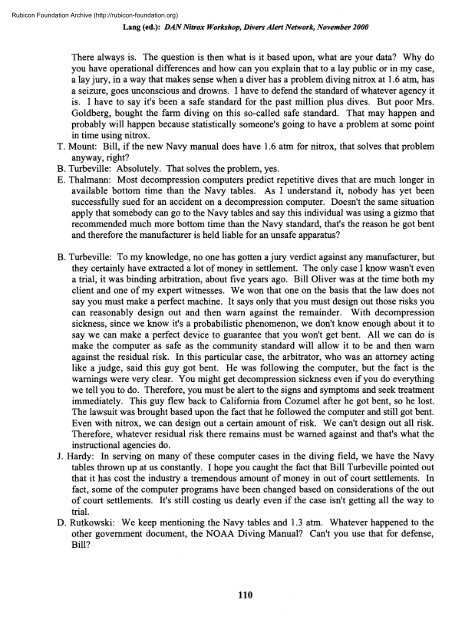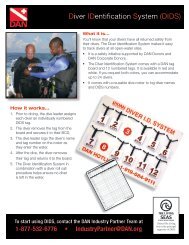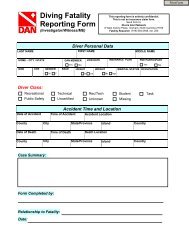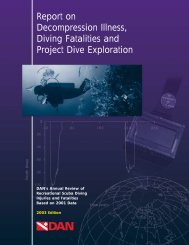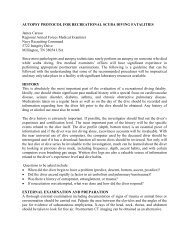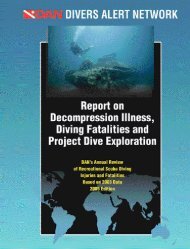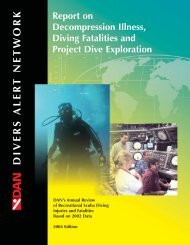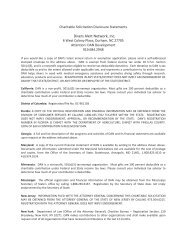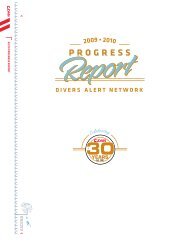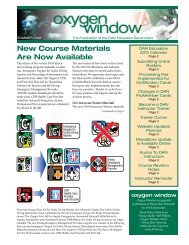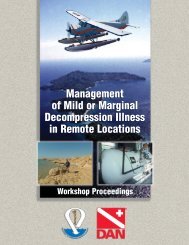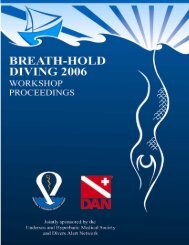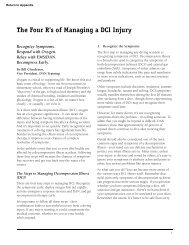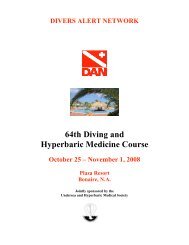Nitrox workshop dings - Divers Alert Network
Nitrox workshop dings - Divers Alert Network
Nitrox workshop dings - Divers Alert Network
Create successful ePaper yourself
Turn your PDF publications into a flip-book with our unique Google optimized e-Paper software.
Rubicon Foundation Archive (http://rubicon-foundation.org)Lang (ed.): DAN<strong>Nitrox</strong> Workshop, <strong>Divers</strong> <strong>Alert</strong> <strong>Network</strong>, November 2000There always is. The question is then what is it based upon, what are your data? Why doyou have operational differences and how can you explain that to a lay public or in my case,a lay jury, in a way that makes sense when a diver has a problem diving nitrox at 1.6 atm, hasa seizure, goes unconscious and drowns. I have to defend the standard of whatever agency itis. I have to say it's been a safe standard for the past million plus dives. But poor Mrs.Goldberg, bought the farm diving on this so-called safe standard. That may happen andprobably will happen because statistically someone's going to have a problem at some pointin time using nitrox.T. Mount: Bill, if the new Navy manual does have 1.6 atm for nitrox, that solves that problemanyway, right?B. Turbeville: Absolutely. That solves the problem, yes.E. Thalmann: Most decompression computers predict repetitive dives that are much longer inavailable bottom time than the Navy tables. As I understand it, nobody has yet beensuccessfully sued for an accident on a decompression computer. Doesn't the same situationapply that somebody can go to the Navy tables and say this individual was using a gizmo thatrecommended much more bottom time than the Navy standard, that's the reason he got bentand therefore the manufacturer is held liable for an unsafe apparatus?B. Turbeville: To my knowledge, no one has gotten a jury verdict against any manufacturer, butthey certainly have extracted a lot of money in settlement. The only case I know wasn't evena trial, it was binding arbitration, about five years ago. Bill Oliver was at the time both myclient and one of my expert witnesses. We won that one on the basis that the law does notsay you must make a perfect machine. It says only that you must design out those risks youcan reasonably design out and then warn against the remainder. With decompressionsickness, since we know it's a probabilistic phenomenon, we don't know enough about it tosay we can make a perfect device to guarantee that you won't get bent. All we can do ismake the computer as safe as the community standard will allow it to be and then warnagainst the residual risk. In this particular case, the arbitrator, who was an attorney actinglike a judge, said this guy got bent. He was following the computer, but the fact is thewarnings were very clear. You might get decompression sickness even if you do everythingwe tell you to do. Therefore, you must be alert to the signs and symptoms and seek treatmentimmediately. This guy flew back to California from Cozumel after he got bent, so he lost.The lawsuit was brought based upon the fact that he followed the computer and still got bent.Even with nitrox, we can design out a certain amount of risk. We can't design out all risk.Therefore, whatever residual risk there remains must be warned against and that's what theinstructional agencies do.J. Hardy: In serving on many of these computer cases in the diving field, we have the Navytables thrown up at us constantly. I hope you caught the fact that Bill Turbeville pointed outthat it has cost the industry a tremendous amount of money in out of court settlements. Infact, some of the computer programs have been changed based on considerations of the outof court settlements. It's still costing us dearly even if the case isn't getting all the way totrial.D. Rutkowski: We keep mentioning the Navy tables and 1.3 atm. Whatever happened to theother government document, the NOAA Diving Manual? Can't you use that for defense,Bill?110


